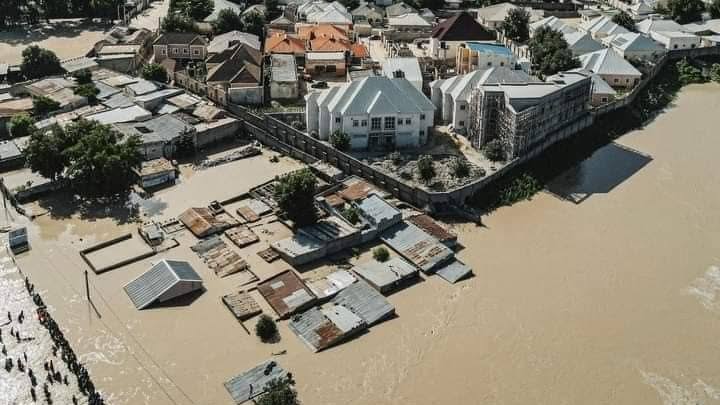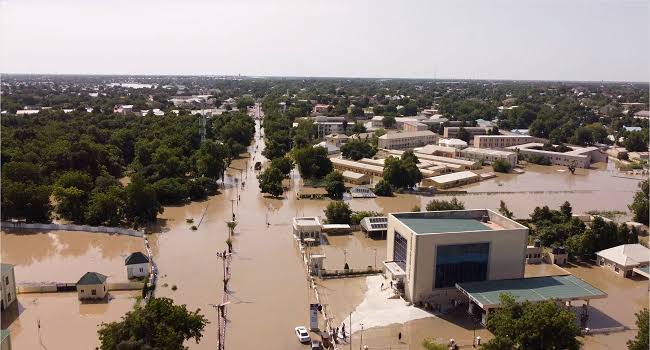The Federal Ministry of Environment has deployed a team of experts to help mitigate the effects of the flooding that occurred in Borno state.
Also, the government said the experts will carry out continuous water sampling and tests and identify sources of hazardous chemicals, and take proactive measures to prevent waterborne diseases.
Last week’s devastating flooding in Borno state affected not less than two million people and killed over 30 people in the state.
The flood, according to the Federal Ministry of Water Resources and Sanitation, was largely due to the overflow of water from the Alau Dam, located about 10 kilometres from Maiduguri city centre, resulting from a massive inflow from the Ngadda River, a major tributary of the River Yedzaram.
In a press statement released on Wednesday, Minister of Environment Balarabe Lawal stated that he accompanied senior ministry officials on a condolence and sympathy visit to the state last Friday in order to mitigate the negative consequences of the sad flood incident.
Lawal emphasised the urgent need for a coordinated and comprehensive response to minimise the environmental concerns brought by the flood.

“During the condolence visit, I informed the Governor that the Federal Ministry of Environment will send a team of experts from the relevant department, agencies and projects to collaborate with Borno State Government in addressing the impacts of the flood,” according to him.
In order to assist in lessening the effects of the flooding, he emphasised that the ministry had sent out a team of experts from the following departments: the Department of Forestry; the Department of Erosion, Flood and Coastal Zone Management; the Department of Pollution Control and Environmental Health; the Nigeria Climate Adaptation-Erosion and Watershed Project; the National Park Services; and the Environmental Health Council.
“The above-mentioned team will conduct continuous water sampling and testing, identify sources of harmful chemicals, and take proactive steps to prevent waterborne infections.
Similarly, the team will conduct continuous sampling of water sources, which is critical for monitoring water quality, finding contamination, and taking proactive measures to protect public health and safety in the state.
All agencies under the Ministry in Borno State have been asked to work with the State Government to minimise the flood calamity.
“So far, 100 drums containing 40kg of chlorine have been deployed in Borno State to disinfect water sources, assuring safe drinking water and preventing waterborne diseases such as cholera.
Furthermore, the Ministry will distribute 30,000 flyers to educate the public on appropriate sanitation and hygiene practices such as proper waste disposal, frequent handwashing, and personal hygiene to help prevent the spread of illnesses.
“Beyond the emergency short-term reaction, the Ministry will collaborate with the Borno State Government to establish comprehensive flood mitigation methods and early warning mechanisms to prevent future occurrences.
We will also look into ways to collaborate with foreign partners to increase the state’s capability for disaster risk management and climate adaption,” he said.
The minister praised Governor Babagana Zulum for his prompt action in mobilising resources and guaranteeing the safety and well-being of the impacted populations.
“I am convinced that, under His Excellency’s capable leadership, Borno State will emerge stronger from this tragedy, and its people’s resilience will shine through once more.
“It is my hope that the Federal Government will unite in resolute pursuit of constructing resilience against similar environmental challenges in the future.”
In Essence
The decision to conduct continuous water sampling and testing, and to identify potential sources of hazardous chemicals, is a crucial step in preventing further health risks, such as waterborne diseases like cholera, which often follow large-scale flooding.
By involving experts from various departments such as Pollution Control, Environmental Health, and Climate Adaptation the government is taking a multi-faceted approach to both immediate and long-term challenges.
The proactive measures, including the disinfection of water sources with chlorine and public awareness campaigns on hygiene practices, show a strong focus on preventing secondary disasters that could arise from the flood’s aftermath.
Additionally, the Ministry’s pledge to collaborate with the Borno State Government to create flood mitigation strategies and early warning systems is critical.
Borno, already dealing with complex security issues, must now face the added pressure of environmental instability. Building resilience against such disasters will be essential in reducing future damage.

















